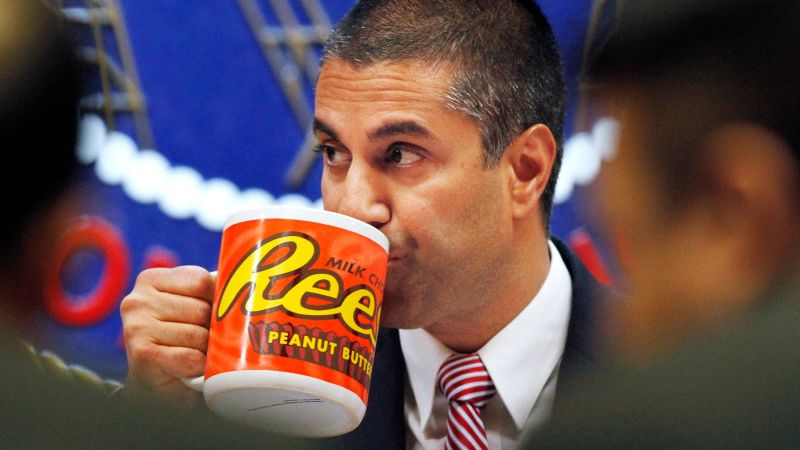I don’t want to hear about CDA Section 230 anymore.
But here I am, hearing about it.
FCC Chairman Ajit Pai is now saying that he has a plan to “move forward with an FCC rulemaking to clarify the meaning of Section 230.”
I intend to move forward with an @FCC rulemaking to clarify the meaning of #Section230.
Read my full statement below. pic.twitter.com/LhUz5XMdSC
— Ajit Pai (@AjitPaiFCC) October 15, 2020
For those who may not know: you should know. But as a reminder: Section 230 of the Communications Decency Act protects “platforms” from legal liability for what is posted on their sites by users. Basically, a “platform” is differentiated from a “publisher,” because they are not curating the content that is posted on their site. This status as “platform” protects them from legal liability for the content posted on their sites.
 What that means in real life is this: Nick Sandmann was able to successfully sue CNN because CNN allowed their journalists to attack and defame him as a racist on their TV channel.
What that means in real life is this: Nick Sandmann was able to successfully sue CNN because CNN allowed their journalists to attack and defame him as a racist on their TV channel.
If you’ll recall, there must have been a billion liberal journalists on Twitter making the same defamatory claims that CNN made, but Twitter was never subjected to legal jeopardy for hosting this same material, because they are a “platform” and not a “publisher.” Ironically, the law was created to enable freedom of speech and prevent the chilling effect of websites fearing legal problems because of their users.
This is the current plan of the Republicans: establish that Twitter is no longer a “platform” and instead a “publisher” because they’ve made so many editorial decisions by banning all of these people that they’ve banned. If they lost their status as a platform under Section 230, the plan goes, they would get hit with X number of defamation lawsuits, which would ultimately collapse the company.
Then, the theory goes, they would be replaced by a different company, which would have different rules about the way it moderated content, and there would be freedom again.
I think this is a lunatic plan.
Firstly, it obviously isn’t going to work. There is too much money involved. Secondly, Section 230 can’t be clarified.
There is no way to implement hard and fast rules for banning across the entire internet. The only thing you could do is say, “no one can ban anyone.” But that would mean that say, the Gamer Uprising forum would lose its 230 status for banning annoying neo-Nazis who ruin threads with edgy anti-social crap.
If you didn’t say “no one can ever be banned for content,” then what exactly would change? Twitter and the rest would just figure out ways to Jew whatever rules you came up with.
Frankly, it’s just a nonstarter and a waste of time.
I personally believe that even without an act of Congress, you could add the big tech companies – namely, Facebook, Twitter and Google – to the provisions of the Telecommunications Act of 1996, which guarantees universal service for common carriers.
Right now, based on the 1996 Act, no telephone company can listen in on your calls and cut your service if you say the n-word. Even if you say the n-word in public, they cannot cut your phone line, because you are guaranteed service of the common carrier.
In 1996, we were still using AOL or Compuserve dial-up internet, that went over a standard phone line. Shortly thereafter however, in the early 00s, broadband internet became a standard, using either a DSL or a cable line. According to the FCC website, they now consider broadband internet something that should have “universal service.” They added that using their own system of rules, without input from Congress, based on the 1996 Act. (As far as the FCC’s ability to make rules: Congress never voted on Net Neutrality, which was a massive overhaul of the way the internet works by the Obama Administration.)
So, it is my contention that it is the Telecommunications Act, and not the Communications Decency Act, that Pai needs to clarify. Obviously, a judge is going to block him if he says that the big three tech companies are now going to be regulated as common carrier communications channels on par with phone lines, but a clarification of CDA 230 would also be blocked by judges.
I think that the argument can be made that Facebook and Twitter are necessary services in the same way that a phone line was a necessary service in the last century. They are used just as widely as phones were used, and are in fact more important now than phones ever were, for people’s personal and professional lives. They are also obviously natural monopolies.
If you’re going to go to the Supreme Court to try to prevent tech censorship without an act from Congress, this is the way to go, no question. Stating that a monopoly communications website like Facebook or Twitter is a communications service which should be universal, in the same way that a road or the mail is universal, is most likely to come to the outcome we want.
This is also not a direct attack on the companies themselves, in the way that undermining CDA 230 is. Yes, these companies have a political agenda, and there are a lot of Jews involved, but if you can set up your attack in such a way that the other side conceding doesn’t cost them any money (and will in fact make them money), then you’re going to get a whole lot less pushback.
What I’ve laid out here is very similar to what is being argued for by Matthew Prince of Cloudflare. He banned me from his service. I was the first site he’d ever banned, and to this day, there are only two sites he’s ever banned (the second being 8chan). When he banned me, he said that he did it to start a conversation. This was in part just bullshit, but he did follow through. His position was that it is not his job to decide what content should be banned, and he said that the situation should be the same as it is with the phone company. He said that banning me from Cloudflare was no different than if Ma Bell had listened in on my phone conversation and banned me because they didn’t like what I said.
Hilariously, after I was banned, Prince could no longer use the “we don’t ban anyone, ever” excuse when harassed by copyright trolls, and immediately got majorly sued.
After the judge allowed the fact that I was banned to be entered as evidence, Prince ended up being forced to settle, and has continued to be sued over and over again for copyright. I’m glad that banning me cost him however many tens of millions of dollars, but ultimately, it cost me in relative terms a lot more than it cost him. My biggest single expense right now comes from paying for the services I have to use to replace Cloudflare. (People ask me how much, but I never answer because I will just be accused of lying. By the way, please remember to donate.)
If these companies were not either run by Jews or under immense pressure from Jews, none of them would want to censor people, as it makes zero financial sense. Getting sued for copyright is the least of it – as we’ve seen, once you start banning, you are then morally responsible for everything you don’t ban. I pointed out after being banned by Cloudflare that they also host ISIS terrorist sites and pedophile websites that have boards discussing how to target children for sex. If they banned me because I was just too immoral, then the fact that they allow ISIS and pedophiles means that they approve of their morality.
Obviously, Jews don’t care about ISIS or pedophilia, but after Twitter and Facebook started banning, the Jews absolutely exploited the situation, saying that if they banned “Nazis,” then it must mean that they approve of everything they’re not banning. (Which is actually a completely sound argument.) That does tie back to the CDC 230 thing.
After the fiasco of agreeing to ban me, Prince went to meet with lawmakers about an agenda to transfer content regulation from the industry to the government, but as I understand it, they didn’t show much interest. I’m not sure to what extent he is still involved in pushing for regulation, but he would be a very good person for Trump to call on here.
The other way for things to go is for Congress to simply pass a law saying that internet monopolies must respect the First Amendment, in every case. But as we well know, the Congress is totally bought off, and there is zero chance that the current Congress, even if we win big in November, would be willing to do this. We would need to start replacing them through the primary system, which we will not have an opportunity to do until 2022.
I was locked out my account for twelve hours for stating something that was a standard line in Trump's 2016 rallies.
Where is the GOP?
Silent. Hiding under their desks.
This is why we lose.
— Lauren Witzke (@LaurenWitzkeDE) October 11, 2020
Current Republicans aren’t going to do anything. They are bought and paid for.
Right now, my impression is that if we get through this election and Trump stays in office, a lot of good things we didn’t expect to happen are going to start happening. I don’t think they will outweigh the bad things that we know are going to happen. But there will be things to be excited about, and things to look forward to.
 Daily Stormer The Most Censored Publication in History
Daily Stormer The Most Censored Publication in History






